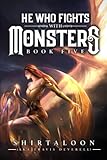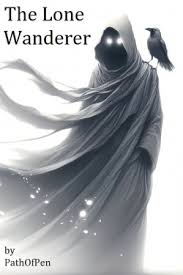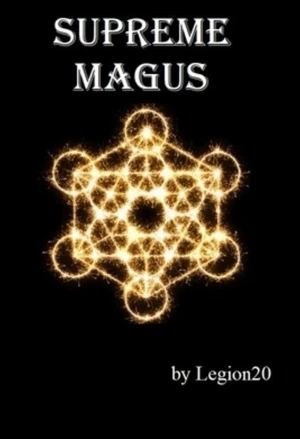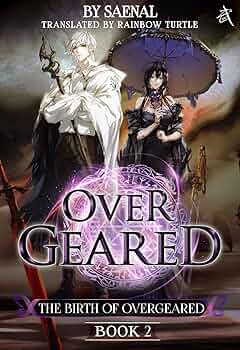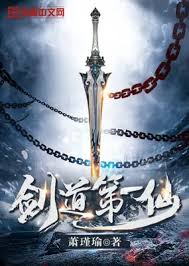The Story in 3 Sentences
Jason Asano wakes up in a world not his own, thrust into Greenstone—a city where monsters roam, the System governs power, and survival hinges on Essence, Affinities, and brutal ritual magic.
He claws his way from powerless office worker to infamous “Monster-Slayer,” wielding the rare Night Essence and an unrelenting will, all while battling enemies from cannibal cultists to biomechanical horrors in spacesuits.
But the real war isn’t just against monsters—it’s within, as Jason grapples with trauma, identity, and the creeping fear that fighting monsters might be turning him into one.
Why It Stands Out
1. Progression That Actually Feels Dangerous
The power system here doesn’t hand out wins—it demands them. Every Essence Jason chooses comes with risk, consequence, and often a grotesque trade-off. Fans praise how progression isn’t just leveling up but surviving mutation, mental collapse, or summoning a “Hedge Caterpillar” that somehow kills a high-rank foe. The System isn’t a benevolent guide; it’s a gauntlet that twists expectations. You don’t just gain power—you earn scars. And the Affinities? They’re not cookie-cutter skills. They’re volatile, unpredictable, and often backfire in ways that feel both hilarious and horrifying. This isn’t a game where you min-max your way to victory. It’s a fight for sanity in a world that rewards ruthlessness.
2. Humor as Survival, Not Just Comic Relief
Jason’s Australian sarcasm and pop-culture riffs aren’t just jokes—they’re armor. In a world where one misstep means death or worse, his humor is a lifeline, both for himself and the reader. Fans consistently note that without his irreverent voice, the story would collapse under its own darkness. He mocks tropes, references Earth movies no one else understands, and nicknames enemies like they’re characters in a bad action flick. But it’s not just comedy. It’s a coping mechanism. It’s how he deflects pain, deflects connection, and sometimes, deflects truth. The series doesn’t just use humor to lighten the mood—it uses it to expose the MC’s fragility. And that makes it real.
3. Unapologetically Flawed MC in a World of Moral Mud
Jason isn’t a hero. He’s not even trying to be one most of the time. He’s arrogant, stubborn, and often blind to his own hypocrisy. Fans are split—some call him “the most relatable LitRPG protagonist ever,” while others say “he needs to shut up and stop lecturing.” But that’s the point. The world doesn’t bend for him. He gets humiliated, betrayed, and broken. His choices have consequences, and the narrative never lets him off the hook. Unlike so many self-insert power fantasies, this one forces the MC to face the cost of his actions. He preaches about not becoming a monster, yet his power—Avatar of Growth—thrives on consumption and mutation. The irony isn’t lost. It’s central. And that’s what makes the story cut deeper than most in the genre.
Characters That Leave a Mark
There’s Farrah Lang – She’s one of the first people to treat Jason like a person, not a curiosity or a threat. A seasoned iron-rank adventurer, she mentors him through the early grind, dragging him through dungeon runs and ritual basics with equal parts patience and sarcasm. Her friendship is a stabilizing force, a voice of reason when Jason’s ego flares. But when tragedy strikes in Greenstone’s underbelly, her fate becomes a turning point—one that fractures Jason’s emotional armor and fuels his darkest arcs. Fans remember her not just for her combat skill, but for the warmth she brings to a cold world.
You’ll meet Gary Bones, who is an orc blacksmith with a love for barbecues and a surprisingly deep emotional core. He starts as a supplier of enchanted gear, but quickly becomes one of Jason’s most trusted allies—and one of the funniest. Their bond is built on food, banter, and mutual respect, forming one of the most genuine bromances in the genre. Gary doesn’t care about titles or power; he cares about loyalty. And when he stands by Jason through the worst of it, it means something. His scenes—whether arguing over seasoning or forging gear in the middle of a crisis—are highlights fans return to again and again.
Then there’s Rufus Remore, not just a mentor, but a gold-rank adventurer carrying his own trauma and doubts. He and Jason start off clashing—Rufus sees recklessness, Jason sees rigidity—but over time, they forge a bond of mutual respect. Rufus doesn’t treat Jason like a student; he treats him like a peer, even when Jason doesn’t deserve it. Their fight scenes together are poetic, blending strategy and raw power in ways that elevate both characters. But what fans love most is his depth—he’s not just a guidepost for the MC. He’s a man wrestling with his past, his choices, and the cost of being strong in a broken world.
The Flaws Fans Debate
Jason’s personality is a lightning rod. Some readers love his raw, unfiltered voice and flawed humanity. Others find him insufferable—too preachy, too full of himself, too quick to lecture while making the same mistakes over and over.
The humor doesn’t land for everyone. While many fans adore the pop-culture riffs and meta jokes, others feel they become repetitive or distract from the tension. “It’s funny the first ten times,” one reader said, “but after a while, it’s just Jason explaining another movie reference no one gets.”
Early pacing and editing are frequently criticized. The first few arcs move slowly, with info dumps and uneven prose that some say improve only by book three. New readers often report needing to push through the rough start to reach the payoff.
The audiobook performance is divisive. Early versions are described as low-energy or poorly voiced, though many fans admit the story’s strength eventually overrides the delivery. “I stuck with it,” one listener said, “because I couldn’t stop caring about what happened next.”
Must-Experience Arcs
Ch. 1–26: The Greenstone Arc – Jason arrives with nothing, learns the basics of the System, and survives on wit and dark humor. He befriends Farrah, Gary, and Rufus, faces cultists in the slums, and undergoes the Night Essence Ritual—a pivotal moment that sets his entire journey in motion. This arc grounds the world, establishes the stakes, and introduces the core cast with emotional weight and gritty realism.
Ch. 58–84: The Astral Space Invasion Arc – Anomalies in “spacesuits” invade Greenstone, wielding lightning guns and advanced tech. Jason’s team is pushed to the brink, suffering heavy losses. The department store battle becomes legendary—Jason uses a minigun, recovers from muscle paralysis, and confronts the psychological toll of constant combat. Fame, trauma, and the cost of power collide here, marking a turning point in his mental state and public image.
Ch. 90–104: The Flesh Abomination Arc – Biopunk horrors mutate across the city, born from Jason’s own actions and powers. With allies scattered, he pushes his Avatar of Growth ability to its limit, cycling health, mana, and stamina in a desperate loop. Emotional deaths hit hard—summoned pods splitting open into weak, dying creatures—mirroring his inner collapse. The resolution is narrow, the cost immense. This arc doesn’t just test his power. It tests his soul.
Killer Quotes
“When you gaze long into the abyss, the abyss gazes also into you. And right now, the abyss is wearing my face.”
“I didn’t come here to be a hero. I came here to survive. And if surviving means I have to fight monsters… well, I’ve got a cheat for that.”
“They call me Monster-Slayer. But I’m starting to wonder—what happens when the slayer needs the monsters to live?”
“You think power makes you special? Try carrying it. Try waking up every day knowing you’re one bad choice away from becoming the thing everyone fears.”
“I make jokes because if I don’t, I’ll scream. And once I start, I don’t think I’ll stop.”
Cultural Impact
“He Who Fights With Monsters” dominates LitRPG and progression fantasy charts on RoyalRoad and Audible, maintaining top rankings for years after its debut.
Fan communities are deeply engaged, with active discussions on Reddit, Discord, and dedicated forums dissecting Essence builds, Affinity synergies, and Jason’s psychological state.
The phrase “fighting monsters” has become a meme beyond the series, used to describe any situation where someone risks losing themselves in the struggle.
Pop culture references in the series—especially Jason’s Australian slang and movie quotes—have inspired fan compilations, joke lists, and even drinking games.
Translation projects exist in multiple languages, including Spanish, German, and Russian, showing strong international reach.
The audiobook, despite early criticism, has cultivated a loyal listener base, with many citing the story’s emotional depth as the reason they kept listening.
“Avatar of Growth” is now a benchmark in power system discussions, often compared to other “cheat” abilities in isekai for its complexity and cost.
Final Verdict
Start Here If You Want:
A LitRPG where power progression feels dangerous, unpredictable, and deeply personal—where every Essence choice could save you or break you.
A protagonist who uses humor as a shield, not just a punchline, and whose internal battle is as gripping as any monster fight.
A story that asks hard questions: What makes a monster? What does power cost? And can you fight darkness without becoming part of it?
Study If You Love:
MCs who are flawed, self-aware, and emotionally complex—especially those who use sarcasm and pop-culture references as psychological armor.
Deep, nerdy worldbuilding with rituals, Affinities, and a magic system that rewards attention and speculation.
Friendships that feel real—bonds built over barbecues, banter, and shared trauma, where side characters have arcs as rich as the protagonist’s.
Avoid If You Prefer:
Fast-paced, action-only narratives—this series lingers on mental health, dialogue, and character development, sometimes at the expense of combat.
Perfect heroes or straightforward morality—Jason is messy, contradictory, and often frustrating, and the story won’t apologize for it.
Minimal exposition—expect detailed explanations of the System, rituals, and mechanics, often delivered in long stretches of internal monologue.
